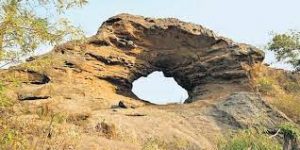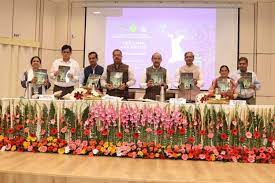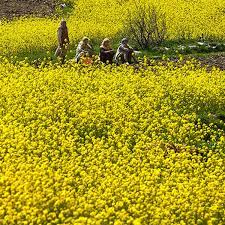Today’s Current Affairs: 20th Jun 2023 for UPSC IAS exams, State PSC exams, SSC CGL, State SSC, RRB, Railways, Banking Exam & IBPS, etc
Table of Contents
LEED Certification:

According to the Green Business Certification Inc. India ranks first globally in LEED Zero-certified green building projects surpassing the US and China.
LEED Certification:
- Leadership in Energy and Environmental Design is the world’s most widely used green building rating system in the world.
- It is available for virtually all building types.
- This certification provides a framework for healthy, highly efficient, and cost-saving green buildings, which offer environmental, social and governance benefits.
- It is a globally recognized symbol of sustainability achievement and leadership.
- To achieve LEED certification, a project earns points by adhering to prerequisites and credits that address carbon, energy, water, waste, transportation, materials, health and indoor environmental quality.
- Projects go through a verification and review process by GBCI and are awarded points that correspond to a level of LEED certification: Certified (40-49 points), Silver (50-59 points), Gold (60-79 points) and Platinum (80+ points).
- This rating system is developed by the United States Green Building Council (USGBC).
Two Non-Steroid Anti-Inflammatory Drug Banned:

The Drugs Technical Advisory Board (DTAB) recommended banning the manufacture, sale and distribution of two non-steroid anti-inflammatory drugs (NSAIDs) Ketoprofen and Aceclofenac.
- Drugs Technical Advisory Board is the highest statutory decision-making body on technical matters related to drugs in India.
- It is established as per the Drugs and Cosmetics Act, 1940.
- It is part of the Central Drugs Standard Control Organization (CDSCO).
- Nodal Ministry: Ministry of Health and Family Welfare.
- It advises the Central Government and the State Governments on technical matters arising out of the administration of the Drugs and Cosmetics Act, of 1940 and to carry out the other functions assigned to it by this Act.
- Non-steroid Anti-inflammatory Drugs are medicines that are widely used to relieve pain, reduce inflammation, and bring down a high temperature.
- These drugs block the production of certain body chemicals that cause inflammation.
- The most popular examples of drugs in this group are aspirin and ibuprofen.
Bhitarkanika National Park : 10-Year-Old Boy Attack By a Crocodile

A 10-year-old boy was allegedly killed recently following an attack by a crocodile sparking fresh bouts of man-animal conflict in areas in the close vicinity of Bhitarkanika National Park.
- Bhitarkanika National Park is located in Kendrapara district in the state of Odisha.
- It is India’s second-largest mangrove ecosystem after the Sunderbans.
- It is a 145 Sq. km large national park which was designated on 16th September 1998 and obtained the status of a Ramsar site in August 2002,e., the second Ramsar site of the State after the Chilika Lake.
- This National Park is a network of creeks and canals which are inundated with waters from rivers Brahmani, Baitarani, Dhamra and Patasala, forming a unique ecosystem.
- Bhitarkanika has one of the largest populations of endangered saltwater crocodiles in India.
- The Gahirmatha Beach, which forms the boundary of the park in the east, is the largest colony of the Olive Ridley Sea Turtles.
- Other mammals include monkeys, jackals, common langurs, otter, sambar deer, jungle cats, fox, Mongoose, wolfs, fishing cats, hyenas, etc.
Tapas Unmanned Aerial Vehicle:

The Indian Navy and the Defence Research and Development Organisation (DRDO) successfully carried out the transfer of command-and-control capabilities of the TAPAS Unmanned Aerial Vehicle (UAV).
- Tapas Unmanned Aerial Vehicle (UAV) is known asTapas-BH 201(Tactical Airborne Platform for Aerial Surveillance-Beyond Horizon 201) , formerly referred to as Rustom-II.
- It is a Medium Altitude Long Endurance (MALE) unmanned aerial vehicle.
- It is being developed by Aeronautical Development Establishment (ADE), Defence Research & Development Organisation (DRDO).
- It is capable of operating at altitudes of up to 28,000 feet with an endurance of over 18 hours.
- The drone has a 20.6-meter wingspan and a maximum speed of 225 kmph.
- It can carry a variety of payloads up to a maximum of 350 kgs.
- It can be controlled remotely and also has the ability to execute pre-programmed flight plans autonomously with precision and flexibility.
- Designed to fulfil the Intelligence, Surveillance, Target Acquisition, Tracking & Reconnaissance (ISTAR) requirements of the tri-services, the Tapas UAV can effectively operate in both day and night conditions.
- It is pre-designed to carry certain weapons and can be converted into an armed platform as and when required by the user.
Rise Of Non-Communicable Diseases In India:

A recent study conducted by the Madras Diabetes Research Foundation in collaboration with the Indian Council of Medical Research (ICMR) and Ministry of Health and Family Welfare has shed light on the growing burden of non-communicable diseases (NCDs) in India.
- The study marks the first comprehensive epidemiological research paper to include participants from 31 states and Union Territories.
- By including data from a wide range of regions, the study provides valuable insights into the prevalence and impact of NCDs, such as diabetes, in the country.
- Findings:
- Goa, Puducherry, and Kerala have the highest prevalence of diabetes, with rates approaching 25-26.4%.
- Diabetes: India now has 101 million individuals with diabetes.
- Prediabetes: The study identified 136 million people with prediabetes.
- High blood pressure: 315 million individuals were found to have hypertension.
- Obesity: 254 million people were classified as generally obese, while 351 million had abdominal obesity.
- The prevalence of generalised obesity stands at 28.6% across the population, while abdominal obesity affects 39.5% of Indians. Female abdominal obesity is particularly high, at 50%.
- Hypercholesterolemia: 213 million individuals had fat accumulation in arteries, increasing the risk of heart attacks and strokes.
- The study reveals that 24% of Indians suffer from hypercholesterolemia.
- High LDL Cholesterol: 185 million individuals had elevated levels of low-density lipoprotein (LDL) cholesterol.
- LDL is the “bad cholesterol” because too much of it in blood can contribute to plaque buildup in the arteries.
Cholesterol travels through the blood on proteins called “lipoproteins.
Gandhi Peace Prize For 2021:

Gita Press, Gorakhpur, a 100-year-old institution that publishes Hindu religious texts and promotes Gandhian ideals of peace and social harmony, has been awarded the Gandhi Peace Prize for 2021 by the Government of India.
- The prize was announced by the Ministry of Culture.
- Gandhi Peace Prize Awards for Social, Economic and Political transformation through Non-violence was instituted in the year 1995, on the occasion of the 125th birth anniversary of Mahatma Gandhi, as a tribute to his ideals and contributions to humanity.
- The award carries an amount of Rs 1 crore, a citation, a plaque and a traditional handicraft or handloom item.
- The award is conferred by the President of India at a function in Rashtrapati Bhavan.
- This award is given to individuals, associations, institutions or organizations who have worked selflessly for peace, non-violence and amelioration of human sufferings.
- The award is open to all persons regardless of nationality, race, language, caste, creed or gender.
- The Award may be divided between two persons / institutions who are considered by the Jury to be equally deserving of recognition in a given year.
Gita Press:
- Established in 1923 by Jaya Dayal Goyandka and Hanuman Prasad Poddar, Gita Press is one of the world’s largest publishers of Hindu religious texts, having published 41.7 crore books in 14 languages, including 16.21 crore copies of Shrimad Bhagvad Gita.
Natural Arch In the Kanika Range Of Sundargarh Forest : Odisha

The Geological Survey of India (GSI) state unit has proposed declaring the “Natural Arch” in the Kanika range of Sundargarh forest division in Odisha as a Geo Heritage Site.
- The natural arch, believed to date back to the Jurassic period, would be the largest natural arch in India with the Geo Heritage tag.
- The site showcases primary sedimentary structures and is believed to have formed due to fault activities and sub-aerial weathering.
- The GSI had previously declared Pillo Lava at Nomira in Keonjhar district as a Geo Heritage Site.
- Geo-heritage refers to the geological features which are inherently or culturally significant offering insight into earth’s evolution or history to earth science or that can be utilized for education.
Geological Survey of India:
- Headquartered in Kolkata, it was set up in 1851 primarily to find coal deposits for the Railways.
- Presently, GSI is an attached office to the Ministry of Mines.
- The main functions of the GSI relate to the creation and updation of national geoscientific information and mineral resource assessment.
National Working Plan Code-2023:

The Ministry of Environment, Forest & Climate Change has released the “National Working Plan Code-2023” for the scientific management of forests and evolving new approaches.
- Scientific forest management is an approach that involves the application of scientific principles and techniques to manage forests sustainably.
- It focuses on gathering data, conducting research, and utilizing evidence-based practices to ensure the long-term health and productivity of forests.
- The plan aims to provide social, economic, cultural, and spiritual benefits from forests.
- “Indian Forest Management Standard” which is a part of this code, takes into account the diverse forest ecosystem in our country while trying to bring uniformity in management.
- The code brings uniformity and acts as a guiding principle for the preparation of working plans across different forest divisions and states.
- The standard aligns with international criteria and indicators for sustainable forest management.
- Institutional framework establishes the policy, legal, and institutional framework necessary for effective forest management.
- For the first time, continuous data collection and updation in a centralized database are prescribed for state forest departments.
- It enables state forest departments to measure the effectiveness of their management practices against the prescriptions of the working plans.
Transgenic Crops In India : Three States Rejected a Proposal

Three States, Gujarat, Maharashtra and Telangana, have recently rejected a proposal, approved by the Centre’s Genetic Engineering Appraisal Committee (GEAC), to test a new kind of transgenic cotton seed.
- Transgenic crops are plants that have been modified through genetic engineering
- These crops have had specific genes inserted into their DNA to give them new characteristics or traits that are not naturally found in the species through traditional breeding methods.
- A Genetically Modified Organism (GMO) is any living organism whose genetic material has been modified to include certain desirable techniques.
- Genetic modification has previously been used for the large-scale production of insulin, vaccines, and more.
- In crops, genetic modification involves the manipulation of DNA instead of using controlled pollination— the conventional method to improve crops— to alter certain characteristics of the crop.
Intersolar Europe 2023 Exhibition:

Indian Renewable Energy Development Agency (IREDA) recently took part in the prestigious Intersolar Europe 2023 exhibition held in Munich, Germany.
- IREDA showcased its commitment to renewable energy financing, sustainability, and fostering partnerships.
- IREDA’s active participation at Intersolar Europe 2023 reflects its dedication to renewable energy development.
- Held in Munich, Germany, this globally acclaimed exhibition provides a platform for industry leaders, manufacturers, suppliers, and service providers to exchange ideas and explore advancements in the solar industry.
- During the exhibition, IREDA seized the opportunity to hold discussions and meetings with key stakeholders.
- A meeting was held to review the progress of the current line of credit and discuss potential future collaborations.
- Additionally, IREDA explored collaborative opportunities and partnerships with Commerz Bank, a renowned German financial institution, to further advance their shared objectives in renewable energy.
- Intersolar Europe is an integral part of The smarter E Europe, the continent’s largest platform for the energy industry.




